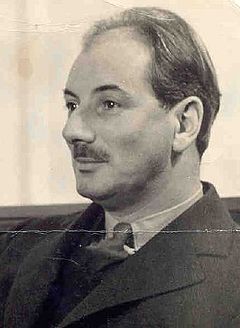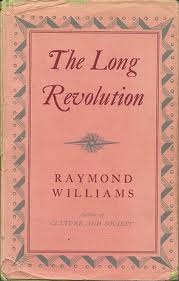
Political philosophy or political theory is the philosophical study of government, addressing questions about the nature, scope, and legitimacy of public agents and institutions and the relationships between them. Its topics include politics, liberty, justice, property, rights, law, and the enforcement of laws by authority: what they are, if they are needed, what makes a government legitimate, what rights and freedoms it should protect, what form it should take, what the law is, and what duties citizens owe to a legitimate government, if any, and when it may be legitimately overthrown, if ever.
Late capitalism is a concept first used in print by German economist Werner Sombart at the start of the 20th century. In the late 2010s, the term began to be used in the United States and Canada to refer to corporate capitalism.

Raymond Henry Williams was a Welsh socialist writer, academic, novelist and critic influential within the New Left and in wider culture. His writings on politics, culture, the media and literature contributed to the Marxist critique of culture and the arts. Some 750,000 copies of his books were sold in UK editions alone, and there are many translations available. His work laid foundations for the field of cultural studies and cultural materialism.

Consumerism is a social and economic order in which the goals of many individuals include the acquisition of goods and services beyond those that are necessary for survival or for traditional displays of status. Consumerism has historically existed in many societies, with modern consumerism originating in Western Europe before the Industrial Revolution and becoming widespread around 1900. In 1899, a book on consumerism published by Thorstein Veblen, called The Theory of the Leisure Class, examined the widespread values and economic institutions emerging along with the widespread "leisure time" at the beginning of the 20th century. In it, Veblen "views the activities and spending habits of this leisure class in terms of conspicuous and vicarious consumption and waste. Both relate to the display of status and not to functionality or usefulness."

Karl Mannheim was an influential Hungarian sociologist during the first half of the 20th century. He is a key figure in classical sociology, as well as one of the founders of the sociology of knowledge. Mannheim is best known for his book Ideology and Utopia (1929/1936), in which he distinguishes between partial and total ideologies, the latter representing comprehensive worldviews distinctive to particular social groups, and also between ideologies that provide support for existing social arrangements, and utopias, which look to the future and propose a transformation of society.

Lewis Mumford was an American historian, sociologist, philosopher of technology, and literary critic. Particularly noted for his study of cities and urban architecture, he had a broad career as a writer. He made signal contributions to social philosophy, American literary and cultural history, and the history of technology.

Terence Francis Eagleton is an English literary theorist, critic, and public intellectual. He is currently Distinguished Professor of English Literature at Lancaster University.
The term culture industry was coined by the critical theorists Theodor Adorno (1903–1969) and Max Horkheimer (1895–1973), and was presented as critical vocabulary in the chapter "The Culture Industry: Enlightenment as Mass Deception", of the book Dialectic of Enlightenment (1947), wherein they proposed that popular culture is akin to a factory producing standardized cultural goods—films, radio programmes, magazines, etc.—that are used to manipulate mass society into passivity. Consumption of the easy pleasures of popular culture, made available by the mass communications media, renders people docile and content, no matter how difficult their economic circumstances. The inherent danger of the culture industry is the cultivation of false psychological needs that can only be met and satisfied by the products of capitalism; thus Adorno and Horkheimer perceived mass-produced culture as especially dangerous compared to the more technically and intellectually difficult high arts. In contrast, true psychological needs are freedom, creativity, and genuine happiness, which refer to an earlier demarcation of human needs, established by Herbert Marcuse.
Modernization theory holds that as societies become more economically modernized, wealthier and more educated, their political institutions become increasingly liberal democratic. The "classical" theories of modernization of the 1950s and 1960s, most influentially articulated by Seymour Lipset, drew on sociological analyses of Karl Marx, Emile Durkheim, Max Weber, and Talcott Parsons. Modernization theory was a dominant paradigm in the social sciences in the 1950s and 1960s, and saw a resurgence after 1991, when Francis Fukuyama wrote about the end of the Cold War as confirmation on modernization theory.

Unilineal evolution, also referred to as classical social evolution, is a 19th-century social theory about the evolution of societies and cultures. It was composed of many competing theories by various anthropologists and sociologists, who believed that Western culture is the contemporary pinnacle of social evolution. Different social status is aligned in a single line that moves from most primitive to most civilized. This theory is now generally considered obsolete in academic circles.

An economy is an area of the production, distribution and trade, as well as consumption of goods and services. In general, it is defined as a social domain that emphasize the practices, discourses, and material expressions associated with the production, use, and management of scarce resources. A given economy is a set of processes that involves its culture, values, education, technological evolution, history, social organization, political structure, legal systems, and natural resources as main factors. These factors give context, content, and set the conditions and parameters in which an economy functions. In other words, the economic domain is a social domain of interrelated human practices and transactions that does not stand alone.

The Condition-of-England question was a debate in the Victorian era over the issue of the English working-class during the Industrial Revolution. It was first proposed by Thomas Carlyle in his essay Chartism (1839). After assessing Chartism as "the bitter discontent grown fierce and mad, the wrong condition therefore or the wrong disposition, of the Working Classes of England", Carlyle proceeds to ask:
What means this bitter discontent of the Working Classes? Whence comes it, whither goes it? Above all, at what price, on what terms, will it probably consent to depart from us and die into rest? These are questions.
Cultural materialism in literary theory and cultural studies traces its origin to the work of the left-wing literary critic Raymond Williams. Cultural materialism espouses analysis based in critical theory, in the tradition of the Frankfurt School.

In political philosophy, particularly Frankfurt School critical theory, advanced capitalism is the situation that pertains to a harmonious and self-regulating economic system, a society in which individual freedom defines wider economic freedom or a capitalist model has been integrated and developed deeply and extensively and for a prolonged period in a freedom based culture. The expression advanced capitalism distinguishes such societies from the historical previous forms of capitalism, mercantilism and industrial capitalism, and partially overlaps with the concepts of a developed country; of the post-industrial age; of finance capitalism; of post-Fordism; of the spectacular society; of media culture; and of "developed", "modern", and "complex" capitalism, all variants of economic freedom.

The sociology of literature is a subfield of the sociology of culture. It studies the social production of literature and its social implications. A notable example is Pierre Bourdieu's 1992 Les Règles de L'Art: Genèse et Structure du Champ Littéraire, translated by Susan Emanuel as Rules of Art: Genesis and Structure of the Literary Field (1996).
Cultural studies is a politically engaged postdisciplinary academic field that explores the dynamics of especially contemporary culture and its social and historical foundations. Cultural studies researchers generally investigate how cultural practices relate to wider systems of power associated with, or operating through, social phenomena. These include ideology, class structures, national formations, ethnicity, sexual orientation, gender, and generation. Employing cultural analysis, cultural studies views cultures not as fixed, bounded, stable, and discrete entities, but rather as constantly interacting and changing sets of practices and processes. The field of cultural studies encompasses a range of theoretical and methodological perspectives and practices. Although distinct from the discipline of cultural anthropology and the interdisciplinary field of ethnic studies, cultural studies draws upon and has contributed to each of these fields.
Political economy in anthropology is the application of the theories and methods of historical materialism to the traditional concerns of anthropology, including but not limited to non-capitalist societies. Political economy introduced questions of history and colonialism to ahistorical anthropological theories of social structure and culture. Most anthropologists moved away from modes of production analysis typical of structural Marxism, and focused instead on the complex historical relations of class, culture and hegemony in regions undergoing complex colonial and capitalist transitions in the emerging world system.
Technological determinism is a reductionist theory that assumes that a society's technology progresses by following its own internal logic of efficiency, while determining the development of the social structure and cultural values. The term is believed to have originated from Thorstein Veblen (1857–1929), an American sociologist and economist. The most radical technological determinist in the United States in the 20th century was most likely Clarence Ayres who was a follower of Thorstein Veblen and John Dewey. William Ogburn was also known for his radical technological determinism and his theory on cultural lag.

Herbert Marcuse was a German-American philosopher, social critic, and political theorist, associated with the Frankfurt School of critical theory. Born in Berlin, Marcuse studied at the Humboldt University of Berlin and then at Freiburg, where he received his PhD. He was a prominent figure in the Frankfurt-based Institute for Social Research – what later became known as the Frankfurt School. In his written works, he criticized capitalism, modern technology, Soviet Communism, and popular culture, arguing that they represent new forms of social control.
Marxist cultural analysis is a form of cultural analysis and anti-capitalist cultural critique, which assumes the theory of cultural hegemony and from this specifically targets those aspects of culture which are profit driven and mass-produced under capitalism.












